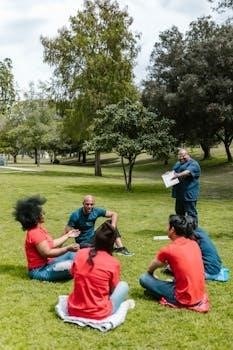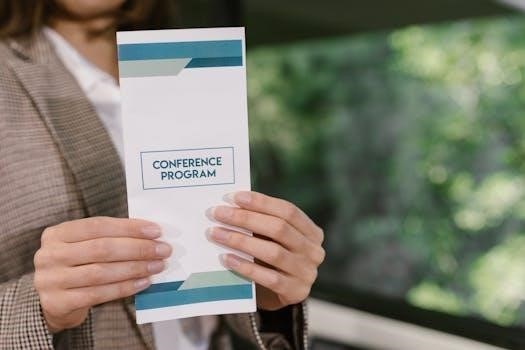What is an Event Planning Questionnaire?
An event planning questionnaire is a document designed to gather essential information from clients. It helps event planners understand needs, preferences, and goals, ensuring a well-planned and successful event. This tool is vital for effective communication.
Purpose and Function
The primary purpose of an event planning questionnaire is to collect detailed information from clients, enabling planners to create a tailored and successful event. It functions as a vital tool for understanding client goals, preferences, and logistical needs. This ensures that the event meets or exceeds expectations. It also serves to streamline the planning process, allowing for more effective resource allocation and better overall event management.

Key Elements of an Event Planning Questionnaire
Essential elements include contact details, event type, and budget information. These key components are vital for understanding client needs and planning a successful event. Including these is crucial.
Contact Details
This section collects essential information like the client’s name, phone number, and email address. Accurate contact information is crucial for seamless communication and coordination throughout the planning process. It also allows event planners to quickly reach out for clarifications or updates, ensuring everyone stays informed and on the same page. This is a fundamental aspect of the questionnaire.
Event Type
This section determines the specific nature of the event. It helps planners understand if it is a wedding, corporate meeting, team-building activity, or any other kind of gathering. Knowing the event type is crucial for tailoring planning strategies, resources, and the overall approach, ensuring the event is aligned with the client’s vision. This detail guides all further planning steps.
Budget
The budget section is critical for understanding financial constraints. This part of the questionnaire helps determine the available funds for the event, which impacts decisions on venue, catering, decorations, and entertainment. An accurate budget enables planners to create realistic and cost-effective plans, ensuring that the event remains within the client’s financial capabilities and avoids overspending. It is an essential element for responsible planning.
Types of Questions Included
Event planning questionnaires include varied questions to cover all aspects. These questions range from event goals and logistical needs to client preferences. They ensure comprehensive information gathering for effective planning.
Event Goals and Objectives
This section focuses on understanding the client’s vision for the event. Questions here aim to uncover the specific purpose, desired outcomes, and overall objectives. It explores what the client wants to achieve, whether it’s fundraising, increased visibility, team building, or any other specific aim. Understanding these goals is crucial for aligning the event with client expectations and measuring success.
Logistical Needs
This part of the questionnaire delves into the practical aspects necessary for event execution. It includes inquiries about venue preferences, guest numbers, required services, and any specific equipment or technical needs. These questions help to gather details about the physical resources, staffing, and infrastructure required to support the event and ensure its smooth operation, covering all practical requirements.
Client Preferences
This section explores the client’s personal tastes and expectations for the event. It includes questions about preferred themes, styles, and overall ambiance they envision. It may also cover catering preferences, entertainment options, and any specific requests or requirements they may have. These questions are designed to capture the client’s vision and enable the planner to tailor the event to their individual tastes.
Benefits of Using an Event Planning Questionnaire
Using an event planning questionnaire streamlines the process, ensuring all essential details are captured. It helps avoid misunderstandings, leading to higher client satisfaction and more effective planning.
Gathering Essential Information
An event planning questionnaire is crucial for collecting key details about an event. It helps planners gather essential information regarding client preferences, logistical requirements, and specific event goals. This includes understanding the type of event, budget constraints, and desired outcomes. By gathering such information, event planners can ensure they are aligned with client expectations from the outset, leading to a more successful and satisfying event. It serves as a foundational step for effective planning.
Informing Event Planning Strategy
The data collected through an event planning questionnaire plays a vital role in shaping the overall event strategy. By analyzing the client’s responses, event planners can make informed decisions about various aspects, including venue selection, catering, and entertainment options. The questionnaire responses highlight the client’s vision, allowing planners to tailor their approach and create a cohesive event plan that aligns with the desired outcomes. This strategic approach maximizes efficiency and ensures the event meets the clients’ specific needs.
Ensuring Client Satisfaction
An event planning questionnaire is crucial for ensuring client satisfaction as it allows event planners to understand their specific expectations and preferences from the very beginning. By proactively gathering information about the client’s vision, budget, and goals, event planners can tailor their services to meet those specific needs. This personalized approach increases the likelihood of a successful and enjoyable event, which ultimately leads to higher client satisfaction and positive feedback. This ensures a smoother planning process.

When to Use an Event Planning Questionnaire
An event planning questionnaire should be used at the initial stages of planning. It is essential for gathering information before decisions are made, ensuring a well-organized event. Use it early.
Pre-Event Planning Stage
At the pre-event planning stage, a questionnaire is crucial for collecting initial client data. This allows for a clear understanding of their vision, budget, and requirements. It sets the foundation for the entire planning process, ensuring alignment and minimizing misunderstandings. This stage is critical for effective planning and client satisfaction; the questionnaire guides the event’s direction.
During the Planning Process
Using a questionnaire during the planning process helps refine event details. It allows for adjustments based on initial feedback and evolving needs. It ensures that all aspects, from logistics to client preferences, are addressed proactively. This ongoing feedback loop allows for informed decisions and ensures that the event remains aligned with the client’s expectations and objectives, improving the overall event experience.
Where to Find Event Planning Questionnaire Templates
Event planning questionnaire templates can be found on various online resources and platforms. Many offer customizable options, catering to different event types and specific planning needs. These are readily available.
Online Resources and Platforms
Numerous websites and online platforms offer free and premium event planning questionnaire templates. These resources often provide a variety of formats and designs, catering to different event planning needs. Platforms specializing in surveys, forms, and event management tools are good starting points. Utilizing these online resources can save time and effort, allowing for efficient questionnaire creation.
Customizable Templates
Many platforms provide customizable event planning questionnaire templates that can be adapted to specific needs. These templates allow users to add, remove, or modify questions. Users can tailor the template to reflect their branding and the unique requirements of each event. Customization ensures the questionnaire effectively captures the necessary information, providing valuable insights for successful event planning. These templates are adaptable and flexible.

How to Customize an Event Planning Questionnaire
Customizing a questionnaire involves adding specific questions that are tailored to the event. You can also adjust it to fit a specific event type, ensuring relevance and detailed responses.
Adding Specific Questions
When adding specific questions, focus on the unique aspects of the event. Consider including questions about specific needs, desired outcomes, and preferred services. This detailed approach helps in gathering comprehensive insights, allowing you to tailor the event precisely to the client’s vision and ensure maximum satisfaction. Tailor the questions to the event’s specifics, like required equipment or dietary needs.
Tailoring to Event Type
Tailoring a questionnaire to the event type is crucial for gathering relevant information. A corporate event will require different questions than a wedding or a team-building activity. Consider the unique requirements of each type of event. Ask questions regarding the specific setup, activities, and logistical needs. This ensures that the questionnaire is effective and leads to a more precise plan.

Using Survey Results
Analyzing data from the questionnaire helps event planners understand client preferences and make informed decisions. This process leads to event improvements and increased client satisfaction by addressing specific needs.
Analyzing Data for Event Improvement
By carefully examining the responses, event planners can identify areas that require adjustments or enhancements. This includes assessing preferences regarding venues, activities, and overall event flow. Data analysis allows for fine-tuning logistics and services to better match client expectations. Ultimately, this leads to a more successful and satisfying event for everyone involved, ensuring a higher quality experience.
Making Informed Decisions
The insights gained from a well-structured questionnaire enable event planners to make knowledgeable choices throughout the planning process. This includes selecting suitable venues, determining appropriate catering options, and allocating resources effectively. By using data-driven decisions, planners can create events that align perfectly with the client’s vision and objectives, optimizing the overall experience for all participants. It also minimizes potential problems.
